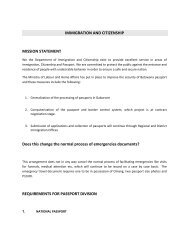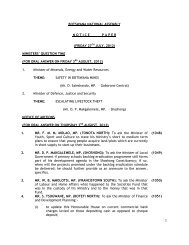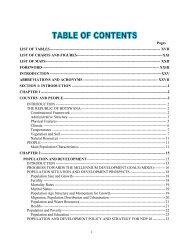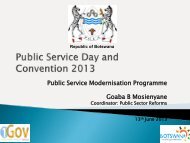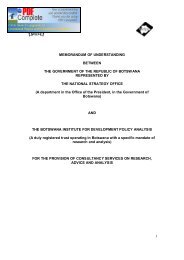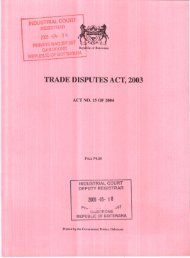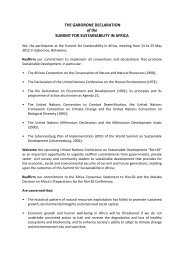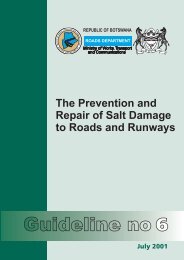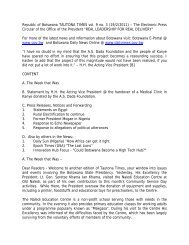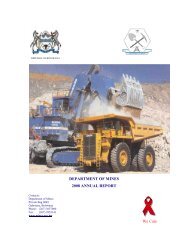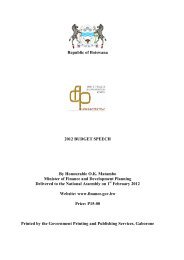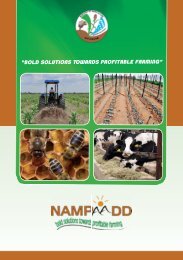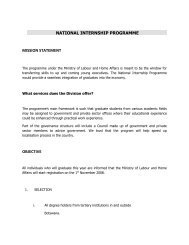National Nutrition and HIV/AIDS Guidelines for Service Providers of ...
National Nutrition and HIV/AIDS Guidelines for Service Providers of ...
National Nutrition and HIV/AIDS Guidelines for Service Providers of ...
You also want an ePaper? Increase the reach of your titles
YUMPU automatically turns print PDFs into web optimized ePapers that Google loves.
CHAPTER 11<br />
NUTRITION EDUCATION AND COUNSELLING<br />
11.1 <strong>Nutrition</strong> Education<br />
<strong>Nutrition</strong> education should assist PLWHA to make healthy dietary choices. As it has been captured in the<br />
previous chapters, adequate nutrition supports normal body functions <strong>and</strong> processes that enable<br />
people to lead healthy lifestyles. Adequate nutrition is influenced by daily food choices that people<br />
make. Many <strong>of</strong> these choices are in<strong>for</strong>med by religious <strong>and</strong> cultural beliefs. In addition, rapid dietary<br />
changes that are brought about, in part, by globalization have resulted in a rapid shift from healthy<br />
traditional <strong>and</strong> indigenous foods to highly processed foods. Yet these highly refined foods have a long<br />
term negative effect on the health <strong>and</strong> nutrition <strong>of</strong> individuals <strong>and</strong> population groups. The emergence<br />
<strong>of</strong> dietary transitions that are typical <strong>of</strong> countries with transitioning market economies can become<br />
particularly challenging <strong>for</strong> PLWHA. PLWHA are bombarded with a plethora <strong>of</strong> fast foods, highly refined<br />
food items, <strong>and</strong> food supplements, many <strong>of</strong> which carry unsubstantiated health claims.<br />
<strong>Nutrition</strong> education is a set <strong>of</strong> learning experiences designed to facilitate the voluntary adoption <strong>of</strong><br />
eating <strong>and</strong> other nutrition-related behaviours that are conducive to health <strong>and</strong> well-being.<br />
“Where the world is changing very slowly, you don't need much in<strong>for</strong>mation. But when change<br />
is rapid, then there is a premium on in<strong>for</strong>mation to guide the process <strong>of</strong> change.”<br />
- Lester Brown.<br />
<strong>Nutrition</strong> education is especially important <strong>for</strong> PLWHA because <strong>of</strong> the nutrition-related dem<strong>and</strong>s that<br />
the virus puts on the body. <strong>Nutrition</strong> education must there<strong>for</strong>e be integrated into the care <strong>and</strong> support<br />
provided to PLWHA. The goal <strong>of</strong> nutrition education must be to help PLWHA underst<strong>and</strong> the need to<br />
maintain an adequate diet <strong>and</strong> how to manage common health problems that may negatively affect<br />
their nutritional status. Many people do not have the necessary knowledge to ensure that they have<br />
adequate nutrition. Thus, every one can benefit from nutrition education which is seen as sharing<br />
in<strong>for</strong>mation <strong>and</strong> giving relevant advice.<br />
<strong>Nutrition</strong> education messages should take into account the different stages in the life cycle; early<br />
childhood, adolescent <strong>and</strong> adult stages. For children, parents should encourage a positive interest in<br />
food <strong>and</strong> eating including;<br />
° Serving attractive foods with colour<br />
° Serving small <strong>and</strong> frequent servings at a time<br />
° Allowing some freedom to choose<br />
° Allowing children to eat the amount <strong>of</strong> food they can h<strong>and</strong>le. Children should not be <strong>for</strong>ced<br />
to eat more food than they can eat.<br />
° Building healthy eating habits very early in children's lives<br />
While it is important to educate children about good nutrition, parents should be made aware that they<br />
are responsible <strong>for</strong> teaching their children bad dietary habits. For the most part children eat what<br />
parents eat. If parents have unhealthy dietary practices, children grow up thinking that these bad<br />
habits are acceptable. For the most part, parents send subtle bad messages about nutrition to children<br />
by buying them junk food <strong>of</strong>ten <strong>and</strong> even packing junk food <strong>for</strong> them while they go to school.<br />
There are difficult challenges that are posed by the adventurous adolescent stage. Some <strong>of</strong> these are<br />
characterised by trials <strong>of</strong> new foods <strong>and</strong> dietary practices, peer pressure, <strong>and</strong> influence <strong>of</strong> advertising.<br />
Depending on the early childhood experiences, adolescents can be rebellious in their rejection <strong>of</strong><br />
52



